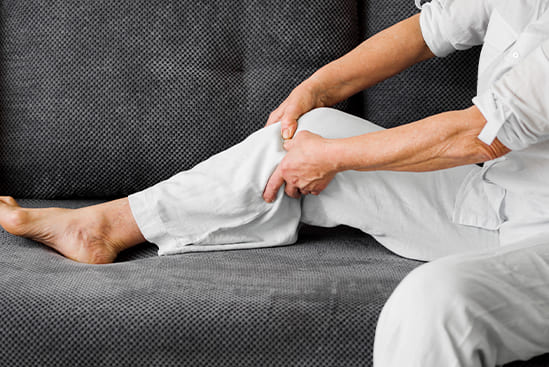
Sports Injuries, Synapse Physiotherapy
Introduction
Chronic pain is an unwelcome companion for many people, affecting their daily lives, work performance, and emotional well-being. If you’ve ever searched for “physiotherapy near me” in hopes of finding a solution, you’re not alone. Millions of individuals worldwide struggle with persistent discomfort caused by injuries, postural issues, or underlying health conditions.
Fortunately, physiotherapy offers a proven, non-invasive pathway to managing and often eliminating chronic pain, restoring function and improving quality of life.
Understanding Chronic Pain
Chronic pain is defined as pain that persists for more than 12 weeks, even after the initial injury or condition has healed. It can be constant or intermittent and ranges from mild to severe. Common causes include:
- Musculoskeletal injuries (e.g., sprains, strains, fractures)
- Degenerative diseases (like osteoarthritis)
- Neuropathic conditions (such as sciatica or diabetic neuropathy)
- Poor posture or repetitive strain
- Past trauma or surgeries
Unlike acute pain, which serves as a warning signal of injury, chronic pain often lingers beyond its useful purpose, disrupting sleep, mood, and overall functionality.
How Physiotherapy Helps with Chronic Pain
Physiotherapy aims to restore normal movement, reduce pain, and prevent recurrence by targeting the underlying dysfunctions. Here’s how:
1. Comprehensive Assessment
To begin with, your journey starts with a thorough evaluation. A physiotherapist will assess your posture, range of motion, muscle strength, joint function, and movement patterns. They may also ask about your medical history, lifestyle, and the nature of your pain. This comprehensive evaluation helps pinpoint the root cause and design a tailored treatment plan.
2. Pain Management Techniques
Furthermore, modern physiotherapy includes a wide array of pain relief modalities. These may include:
- Manual Therapy – Hands-on techniques to improve tissue flexibility and joint mobility.
- Dry Needling – Targeting trigger points to relieve muscle tightness.
- Electrotherapy (TENS, ultrasound) – Using controlled electrical signals or sound waves to reduce inflammation and promote healing.
- Taping and Bracing – Supporting injured structures and guiding proper movement.
3. Corrective Exercises
In addition, targeted strengthening and stretching exercises form the core of physiotherapy. These exercises help recondition weak muscles, correct imbalances, and improve joint stability. A well-prescribed exercise plan can reduce reliance on pain medications and prevent the pain from returning.
4. Postural and Ergonomic Training
Moreover, many chronic pain cases are caused or worsened by poor posture or repetitive strain, especially in work settings. Physiotherapists provide ergonomic advice and teach proper movement mechanics to prevent flare-ups.
If you’re dealing with conditions like slip disc, targeted physiotherapy for slip disc is essential in reducing nerve compression and enhancing spinal mobility.
Benefits of Finding Physiotherapy Near You
If you’re living with chronic pain, convenience plays a significant role in sticking with your treatment plan. That’s why searching for physiotherapy near me can be the first step toward consistent, effective care.
Why Proximity Matters
Here’s why location matters:
- Regular Sessions: Chronic pain often requires multiple visits. A nearby clinic makes it easier to maintain consistent appointments.
- Personalised Follow-Ups: Local physiotherapists can provide closer follow-ups and adapt your program based on progress.
- Emergency Consults: In the case of sudden flare-ups, a nearby clinic means faster access to care.
- Community-Based Therapists: Local practitioners often understand lifestyle-related pain factors specific to your area (e.g., desk jobs, sports injuries, long commutes).
Additionally, if you’re managing a slip disc, having a local clinic that offers strength & conditioning programmes or shockwave therapy can be a game changer for long-term spinal health.
What to Look for in a Physiotherapy Clinic
Choosing the right clinic can drastically influence the success of your treatment. Here’s what to consider:
1. Qualified and Experienced Therapists
Check for certifications, areas of expertise, and years of experience. Some therapists specialise in orthopaedics, sports injuries, or neurological conditions. Choose one that aligns with your needs.
2. Personalised Treatment Plans
Avoid one-size-fits-all approaches. The best physiotherapy is customised based on your pain profile, goals, and daily activities.
3. Comprehensive Facilities
Clinics equipped with the latest modalities (like ultrasound, dry needling, and shockwave therapy) offer more versatile treatment options.
4. Patient Reviews and Testimonials
Feedback from other patients can give you insight into the quality of care, bedside manner, and results.
5. Transparent Pricing and Accessibility
Check if the clinic offers flexible hours, package rates, or insurance support. This can make long-term treatment more sustainable.
Frequently Asked Questions (FAQs)
1. How does physiotherapy help manage chronic pain?
Physiotherapy addresses chronic pain by identifying and treating the root cause whether it’s muscle imbalance, joint dysfunction, or poor posture. Through a combination of manual therapy, corrective exercises, and pain relief techniques, it helps restore mobility, reduce discomfort, and prevent recurrence.
2. How many physiotherapy sessions are typically needed for chronic pain?
The number of sessions depends on factors like the severity of the condition, duration of pain, and individual goals. Some people see improvement within a few sessions, while others with long-standing issues may require a longer treatment plan. Regular sessions are essential for long-term relief.
3. Is physiotherapy suitable for all types of chronic pain?
Yes, physiotherapy is effective for many types of chronic pain, including back and neck pain, joint pain (like knees and shoulders), post-surgical rehabilitation, arthritis, and repetitive strain injuries. A qualified physiotherapist will tailor the approach to your specific condition.
4. What should I expect during my first physiotherapy session?
Your first session typically includes a detailed assessment of your posture, movement patterns, joint mobility, muscle strength, and pain history. Based on this, the physiotherapist will create a personalised treatment plan, which may include hands-on therapy, exercises, and lifestyle advice.
5. Can I receive physiotherapy at home if I can’t travel?
Yes, many clinics now offer home visit physiotherapy services for individuals who have mobility limitations or severe pain that makes travel difficult. This ensures you still get expert care in the comfort of your own home.
Conclusion
Chronic pain can seem overwhelming, but it doesn’t have to be a permanent part of your life. Physiotherapy combines expert knowledge, personalised care, and hands-on techniques to effectively manage and reduce pain. By choosing a clinic near you, you increase your chances of staying consistent with treatment and achieving long-term relief.
So, next time you find yourself typing physiotherapy near me into a search engine, remember that it could be the first step toward a healthier, pain-free life. Prioritise your well-being, take action, and trust in the power of professional physiotherapy. Especially for conditions like chronic pain, targeted care and programs such as spine & core rehabilitation can truly transform your recovery journey.
Tags :

Back & Neck Pain
Conditions such as stiffness, postural abnormalities and muscle overuse from prolonged desk work at the office or home is more prevalent than most would think. We provide the necessary tools to fix you up and educate you on ergonomics which can unload unnecessary stress.
- Spine & Core Rehabilitation
- Strength & Conditioning Programme
- Pain Management
- Biomechanical Assessment
- Sports Physiotherapy
- Group Class

Sports Injuries
Rolled ankles, jarred knees, impinged shoulders are few conditions in the plethora of sports injuries which can hamper performance and limit our enjoyment of sports. Physiotherapy not only treats the symptoms of these conditions but propels your overall fitness to greater heights.
- Strength & Conditioning Programme
- Pain Management
- Biomechanical Assessment
- Sports Physiotherapy
- Shockwave Therapy
- Group Class

Work Desk Injuries
Conditions such as stiffness, postural abnormalities and muscle overuse from prolonged desk work at the office or home is more prevalent than most would think. We provide the necessary tools to fix you up and educate you on ergonomics which can unload unnecessary stress.

Pre-Post-Surgical Conditions
Surgery involves going through preparation both before and after. Physiotherapists play a vital role in getting your body ready for surgeries with circulatory, breathing and strengthening exercises. After the procedure, let us be there for your recovery and rehabilitation, taking it one step at a time.

Scoliosis & Postural Abnormalities
The way we stand, sit, walk and sleep has influence over our posture and the overall balance of muscles controlling its alignment. A comprehensive screening can be done by our physiotherapists to detect abnormalities, which we will aid in correcting.

Neurological Conditions
Neurological disabilities such as stroke, nerve compression and neuropathies can be barriers for patients to live life to its fullest. We at Synapse are committed to help you overcome these hurdles by ensuring functional mobility and quality of life is at its optimum by providing the right treatment and exercises.

Osteoarthritis & Rheumatism
Joint degeneration and inflammation happens as the human body grows older, but that does not mean our way of life degenerates as well. Relief your joint pains with a joint effort together with your physiotherapist, who will provide pain-relief treatments and prescribe exercises for your wellbeing.

Conditions Relating To Elderly
Common conditions in the older age population include hips & knee pain, back & neck pain, osteoarthritis, rheumatism, fear of falling and many more. Aging and degeneration of bodily function is inevitable, but here at Synapse, we will help you live the best of your life.

Home Physiotherapy
We understand that some conditions or injuries can make it difficult to receive rehabilitation at our clinic be it mobility or transportation issues. Our objective is to provide you with the same high-quality physiotherapy services at home that you would receive in-clinic.
